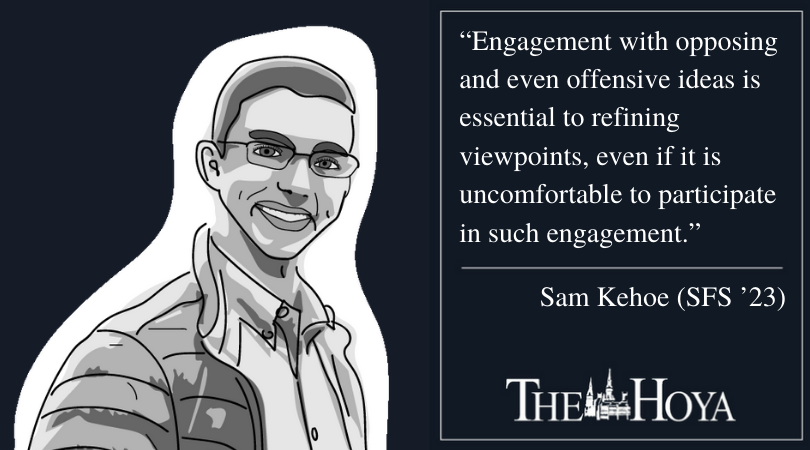The Georgetown University College Republicans hosted the son of President Donald Trump on Feb. 25, offering a chance for the student body to define its relationship with free speech. As college students in the United States increasingly engage in protests aimed at “shutting down” controversial speakers, the modern university has been forced to walk the line between tranquility and free expression on campus.
The principles of free speech have been increasingly criticized as being used as excuses to give platforms to hateful rhetoric. The push for the prohibition of hate speech has two critical weaknesses, the first of which being that the group in power gets to decide what qualifies as “hate speech.” Such authority opens up the possibility for blanket censorship of contrarian ideas under the banner of protecting communities from hate.
The second issue with a hate speech prohibition policy is much more dangerous and immediate. By banning any particular speaker, even an overtly hateful one, a small subset of people could feel they are fighting on the side of the righteous. Banning speakers, however, can create a small but loyal group of radicalists whose ideas are forged without the moderating influences of open dialogue. Only the light of discourse can cast out the darkness of hate. Such discourse is especially important when one group argues that a particular speaker is hateful and another is not. Engagement with opposing and even offensive ideas is essential to refining viewpoints, even if it is uncomfortable to participate in such engagement.
In 2016, The University of Chicago famously committed itself to defending freedom of expression on campus by sending a letter to incoming students warning that it does not intend to create intellectual safe spaces. Dozens of other universities, including Georgetown University, signed onto a similar policy. But of course, there’s a difference between what the administration’s handbook says and what the student body believes. The administration may provide resources and facilities to a wide array of speakers, but coordinated boycotts or planned disruptions of events by student groups demonstrate a disjointed commitment to free expression in the campus community.
Thankfully, despite the charged atmosphere that emerged around Eric Trump’s (MSB ’06) visit to campus, toleration won the day as the event was allowed to occur. We should be proud of our deliberate commitment to free expression because academic institutions are one of the few places to safely engage in difficult discussions in modern America. We have seen brawls break out among radical fringe groups near political gatherings, and mass media debates increasingly lack substance. These examples demonstrate that peaceful free speech is becoming increasingly difficult to practice in public life.
The American college may well be the last great hope for our country’s experiment with free speech. Institutions dedicated to “research” ought to be dedicating themselves to recording the results of our cultural experiment with unrestricted dialogue. Just as universities strive to surround their students with brilliant professors and access to academic texts, they should strive to create an environment for open expression.
The virtue of free speech is that one can profoundly disagree with a speaker and still leave the room having a greater understanding of a particular political climate. In order to be truly confident in political beliefs, one must not fear ideological challenge. We mustn’t conflate hearing an opinion with subscribing to it.
Walt Whitman, in his poem “Song of Myself, 51” once justified contradicting himself with the retort, “I am large, I contain multitudes.” Whitman’s point, that we are built with the enormous capacity to hold ideas that object to each other in the same mind, is especially important as we confront the question of hearing contradictory opinions. As members of the Georgetown community, we must affirm that we are capable of hearing opposing and even seemingly harmful ideas without being ideologically torn apart within our minds or socially divided on campus.
As much as we like to aggrandize campus activism, the reality is that student political clubs rarely put on events that move any needle. Regardless of party, speakers visiting campus have little influence over campus life. Eric Trump’s talk did not seriously impact the nation or the university, and neither will Speaker of the U.S. House of Representatives Nancy Pelosi’s (D-Calif.) coming visit. But what we can do is decide to uphold the principles of free speech in our community to allow our society evolve peacefully into the conversations of the next generation.
Sam Kehoe is a freshman in the College. Pondering Politics appears online every other Tuesday.















Carol Harrison • Mar 2, 2020 at 1:34 am
Exceptionally well written, articulate, and insightful. Thank you , Sam Kehoe.